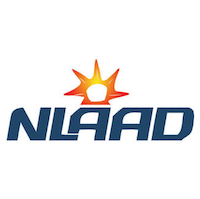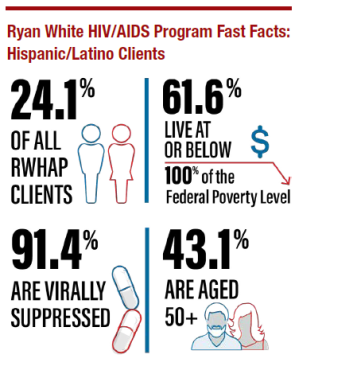
Nearly one-fourth (24.1%) of Ryan White HIV/AIDS Program (RWHAP) clients are Hispanic/Latino, according to the 2021 RWHAP Annual Client-Level Data Report (HRSA, 2022). Of the more than half a million clients served by the RWHAP, three-fourths are racial and ethnic minorities.
The vast majority of RWHAP clients have achieved viral suppression and are managing their HIV disease. Rates of viral suppression among RWHAP clients receiving HIV medical care have improved dramatically from 2010-2021 (69.9% to 89.7%).

HRSA HIV/AIDS Bureau Fact Sheets, March 2023.
Parallel improvements have been realized among Hispanic/Latino RWHAP clients (73.6% to 91.4%) and all other RWHAP populations
Latinos represented 29% of new HIV diagnoses in the United States in 2019, with most cases being among Latino gay and bisexual men (CDC, 2022).
Best Practices
HRSA's Ryan White HIV/AIDS Program's Best Practices Compilation contains HIV care interventions with evidence of their efficacy in improving HIV care. As of September 2023, the following have a focus on Latino/Hispanic populations.
Cultural Focus: People of Mexican Descent
In Dallas, a project called Viviendo Valiente (a HRSA SPNS project) used individual- and group-level events, along with promotores (Latino-identifying Spanish-speaking staff) to work with clients. The project achieved increases in HIV testing and care engagement.
Bilingual and Bicultural Care Team
The Bilingual and Bilingual Care Team assembled for this Kansas City, Missouri project was comprised of a peer educator, case manager, and clinician. Results from their work from 2005-2007 were as follows: the average number of annual visits increased from 2.8 pre-intervention to 5.3 for the post-intervention year; of the 38 enrollees, only 8 were initially virally suppressed but 20 achieved non-detectable status after the intervention. This project is also a former SPNS site. See the implementation tools developed under the HRSA-funded Center for Innovation and Engagement (CIE).
Transgender Latinas
TransActivate worked to improve linkages to care for Latina transgender women. Project components included, for example, linkage coordinators/peer navigators, social media and mobile testing, and engaging clients with social networks. Over 1,000 HIV tests were administered and "96% of clients with a new diagnosis of HIV or who had fallen out of care received timely linkage to care."
TransActivate is also a former SPNS project, operated by Bienestar Human Services, a Los Angeles program with a long history of working with the transgender community.
Transitioning from Incarceration
Pay it Forward Transitional Care Coordination focused on workforce capacity to connect Puerto Ricans with HIV to community-based HIV care and social supports following release from jail. Among their results: "Following the implementation of the TCC model, 54 of the 58 people with HIV transitioning to the community from jail were linked to community-based HIV medical care. Most of those connected to community support, and were retained in care at six and 12 months."
This SPNS project (developed under two separate SPNS initiatives) was also part of the Dissemination of Evidence Informed Interventions (DEII) pipeline for identifying optimal best practices. Among their implementation tools is a Care and Treatment Interventions (CATIs) Manual and training curricula.
Community Support Events
Proyecto Promover in Chicago focused on Mexicanos with HIV. This former SPNS project reported the following: "Evaluation results indicated strong retention in care and viral suppression for clients participating in Proyecto Promover from 2014 to 2016. While community events showed good turnout and participation, only a moderate number of new and lost to care clients were linked to HIV medical care through the events."
TA and Training Resources
Access TA and training resources for Latino populations in the Hispanic/Latino topic page as well as the full collection of materials in Spanish. Highlights include:
- Videos educativos para mujeres de color con el VIH is a series of patient-focused videos, prepared by HRSA's Dissemination of Evidence Informed-Interventions Project (DEII).
- Health coverage enrollment Resources for Consumers, including materials in Spanish, were developed by HRSA's ACE TA Center.
Continuity of Care: U.S.-Mexico Border AETC Steering Team (UMBAST)
This collaborative project spans the four U.S. states that border Mexico, and provides onsite training for border clinicians and community health workers (in English and Spanish). UMBAST has also produced care continuity resources to assist providers with patients returning to Mexico and Central America, or those with patients detained by U.S. Immigration and Customs Enforcement.
